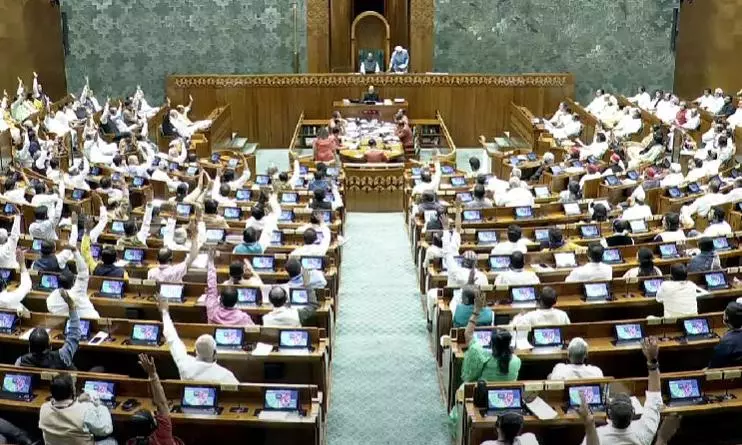RS approves Waqf Bill, to be renamed Umeed by Centre
“The government has introduced the Bill with good intentions and thus renamed it as ‘Umeed’. No one should have any problem with the name,” Kiren Rijiju added.

New Delhi: The Rajya Sabha passed the contentious Waqf (Amendment) Bill, 2025 in the early hours of Friday morning after a marathon debate between the Treasury and Opposition benches. The House also passed the Mussalman Waqf (Repeal) Bill 2024. The Bills will now go to the President for assent.
After the Lok Sabha passed the Bill early on Thursday 288-232, Union minority affairs minister Kiren Rijiju on Thursday tabled it in the Upper House. The Bill aims to include all Muslim sects in the Waqf Board.
The minister said there were 4.9 lakh Waqf properties in 2004, which had now increased to 8.72 lakh. Rijiju said it aimed to accomplish the unfulfilled tasks of the previous governments.
“The government has introduced the Bill with good intentions and thus renamed it as ‘Umeed’. No one should have any problem with the name,” the minister added. The government proposes to rename the Bill as Unified Waqf Management Empowerment, Efficiency and Development (Umeed) Bill.
Hitting back, Congress MP Syed Naseer Hussain termed the Bill unconstitutional and alleged that it targeted the Muslim community, even as he accused the BJP of using the legislation to trigger communal tension and polarisation in order to strengthen its votebank. He alleged that the Bill sought to treat Muslims as second-class citizens.
Leader of the House J.P. Nadda accused the Congress of making Muslim women second-grade citizens during its rule at the Centre.
Leader of the Opposition Mallikarjun Kharge accused the government of trying to sow the seeds of conflict by suppressing Muslims through the Bill. He said the legislation was “unconstitutional” and not good for Muslims. He urged the government to withdraw the bill, which he said had a lot of “mistakes” and not make it a prestige issue.
Kharge alleged that the ruling dispensation wanted to take away the land of Muslims and hand it over to its corporate friends. He also questioned the bill’s membership rules for non-Muslims, drawing comparisons to Hindu trusts where Muslims cannot be members. He asked, if Hindu trusts restrict membership to their own faith, why should the Waqf Board allow members from other religions. He even added that people like him of SC are not trustees.
Nadda said the Modi government had brought Muslim women into the mainstream by banning the practice of triple talaq.
“I stand in support of the (Waqf) bill as its sole purpose is to bring reforms in managing the Waqf properties,” Nadda said. Referring to some Opposition MPs, he added many members of the House just come into the House, give speeches and then walk off.
Chairman Rajya Sabha Jagdeep Dhankhar also added that some MPs come only to give speeches.
During the discussion a war of words broke out between Independent MP Kapil Sibal and Rijiju.
“When it is my land, then who are you to make law for that?” Sibal said. He mentioned that there are over 10-lakh acres of land in Hindu (religious) institutions in four states.
“In the Hindu religion, the self-acquired property can be given to sons and not daughters,” Sibal said.
Rijiju intervened and objected to the wrong comparison of religious land of Hindus in four states with that of Muslims. The minority affairs minister attacked the senior Rajya Sabha member for creating confusion and raising issues in the House but not staying back to listen to the replies of ministers concerned. He said that Sibal has created confusion on the bill by comparing properties of Waqf bodies with those of other religious bodies.
Union finance minister Nirmala Sitharaman mentioned that the government appoints the officials to manage these religious bodies which manage these (Hindu) properties.
Hitting back, Sibal said that he was making the same point that these properties are maintained by the government and also the Waqf statutory bodies have people who are government appointed.
Chiding the minority affairs minister, Sibal said, “The minister does not know the difference between a trust and waqf. A waqf property belongs to God and cannot be sold. It can be donated for graveyards, schools, etc. Once the land is donated, it cannot be taken back, unlike trusts,” he said.
The content and intent of the Waqf bill put a question mark on the government, said RJD Member Manoj Jha in the Rajya Sabha, asking it to not hurry with the bill and send it to the select committee of Parliament once again.
Participating in the debate, CPI(M) John Brittas said the bill is a summary assault. This “attacks the basic tenets of India’s Constitution, where it is secularism, where it is democracy and equality. There is a cardinal violation happening, he said.
YSRCP’s Y.V. Subba Reddy and BJD’s Muzibulla Khan opposed the bill, saying it is unconstitutional.
All religions must be treated with respect and the government must prevent India from shifting towards a totalitarian state, Samajwadi Party’s Ram Gopal Yadav said.
DMK leader Tiruchi Siva said his party opposes the bill, as it is legally flawed. “I stand on behalf of my party to oppose this bill... We reject the bill in its entirety because it is legally flawed, constitutionally indefensible and morally reprehensible,” he stated.
“The new Waqf bill reeks of mistrust,” said TMC MP Sushmita Dev.
